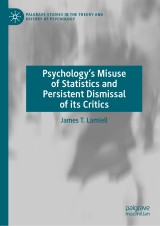Details

Psychology's Misuse of Statistics and Persistent Dismissal of its Critics
Palgrave Studies in the Theory and History of Psychology
|
117,69 € |
|
| Verlag: | Palgrave Macmillan |
| Format: | |
| Veröffentl.: | 27.03.2019 |
| ISBN/EAN: | 9783030121310 |
| Sprache: | englisch |
Dieses eBook enthält ein Wasserzeichen.
Beschreibungen
This book is a strenuous critique of the misinterpretation of statistical knowledge of populations in mainstream psychology, exploring the implications of assuming that those statistics constitute scientific knowledge of individuals. It investigates the essential nature and historical roots of this interpretive practice, and documents the lack of change in mainstream thinking despite previous critiques of the practice. The author contends that prevailing interpretive traditions result in bad science, in that invalid claims are made to knowledge of individuals. He also discusses the socio-ethical problems resulting from this misinterpretation of statistics, where psychological practitioners unjustifiably endorse interventions in the lives of individuals. Lamiell urges psychologists to abandon the aggregate statistical methods which he argues have transformed the field into ‘psycho-demography,’ and to embrace instead alternative research methods that are logically suited to gaining scientific knowledge about the psychological functioning of individuals. This book concludes by highlighting some of the currently available methodological alternatives, as well as discussing some enduring conceptual impediments to the serious consideration of those alternatives.<p></p>
<p>Chapter 1: Introduction: Mainstream Psychology’s Worrisome Incorrigibility.- Chapter 2: Challenging the Canon: The Critique and its Aftermath in Autobiographical Perspective.- Chapter 3: The Entrenchment of Statistical Thinking in Early Twentieth Century.- Differential Psychology.- Chapter 4: The Failure of Critical Thinking in the Statistization of Experimental Psychology.- Chapter 5: Statistical Thinking in Psychology: Some Needed Critical Perspective on What ‘Everyone Knows’.- Chapter 6: ‘Statisticism’ in Psychology as a Socio-Ethical Problem.- Chapter 7: In Quest of Meaningful Change.</p><div><br></div>
James T. Lamiell is Professor Emeritus of Psychology at Georgetown University, USA after having spent thirty-six years on the faculty at that institution. He holds the 2001 Bunn Award for Faculty Excellence at Georgetown, and is a three-time Fulbright scholar to Germany. He has authored four books and translated a fifth.<p></p>
This book is a strenuous critique of the misinterpretation of statistical knowledge of populations in mainstream psychology, exploring the implications of assuming that those statistics constitute scientific knowledge of individuals. It investigates the essential nature and historical roots of this interpretive practice, and documents the lack of change in mainstream thinking despite previous critiques of the practice. The author contends that prevailing interpretive traditions result in bad science, in that invalid claims are made to knowledge of individuals. He also discusses the socio-ethical problems resulting from this misinterpretation of statistics, where psychological practitioners unjustifiably endorse interventions in the lives of individuals. Lamiell urges psychologists to abandon the aggregate statistical methods which he argues have transformed the field into ‘psycho-demography,’ and to embrace instead alternative research methods that are logically suited to gaining scientific knowledge about the psychological functioning of individuals. This book concludes by highlighting some of the currently available methodological alternatives, as well as discussing some enduring conceptual impediments to the serious consideration of those alternatives.<div><br></div><div>James T. Lamiell is Professor Emeritus of Psychology at Georgetown University, USA after having spent thirty-six years on the faculty at that institution. He holds the 2001 Bunn Award for Faculty Excellence at Georgetown, and is a three-time Fulbright scholar to Germany. He has authored four books and translated a fifth.</div><br>
Challenges a deep, abiding and problematic concept in mainstream psychological statistics Offers an assertive critique of the statistically-based knowledge claims that pervade psychological research Explains why the few and isolated attempts made to refute this argument have not been sufficient
Diese Produkte könnten Sie auch interessieren:

Prospektiv valide emotionale Phantasie als Teilaspekt der emotionalen Kompetenz

von: Irina Broich

48,00 €















